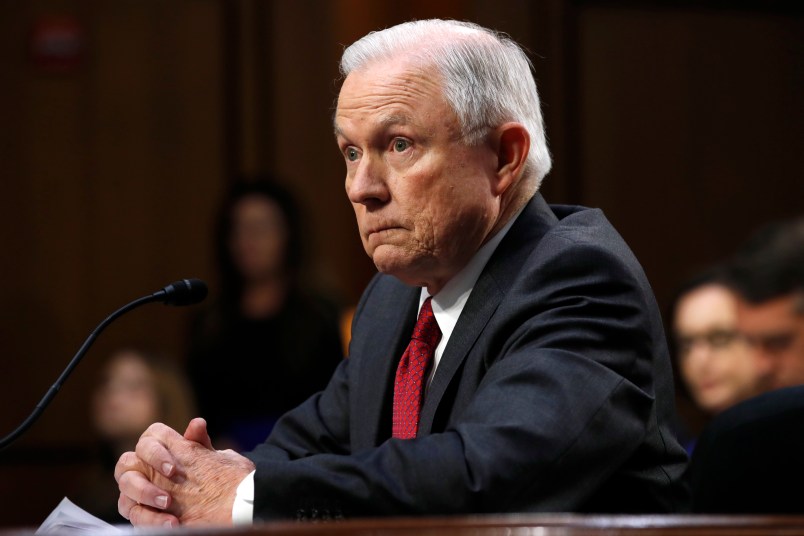In his highly charged hearing Tuesday, Attorney General Jeff Sessions gave the Senate Intelligence Committee several variations of what happened at the Mayflower Hotel on April 27, 2016, when then-candidate Donald Trump gave a Russia-friendly foreign policy speech attended by a crowd that included Russian Ambassador Sergey Kislyak.
At a VIP reception following the speech, Kislyak, Trump, and Sessions were all in the same room, but whether they spoke and what they spoke about remains in dispute.
Ousted FBI Director James Comey reportedly told the committee in a classified session last week that U.S. intelligence agents intercepted communications between Kisklyak and Russian officials back in Moscow that suggested the ambassador and Sessions met on the sidelines of that event—a charge Sessions and the Justice Department have denied.
But Sessions’ various answers throughout Tuesday’s hearing did little to clear up the confusion.
In his opening statement, Sessions broadly declared: “I did not have any private meetings nor do I recall any conversations with any Russian officials at the Mayflower Hotel. I did not attend any meetings at that event.”
But later, when questioned by Sen. Mark Warner (D-VA), Sessions said that “it’s conceivable that [a conversation with Kislyak] occurred” but that it included “nothing improper.”
Then, in response to questions from Sen. Roy Blunt (R-MO), Sessions said: “I didn’t have any formal meeting with him. I’m confident of that. But I may have had an encounter during the reception.”
“I have no recollection of a discussion with the Russian ambassador,” Sessions later added, though he allowed such a discussion may have occurred.
Though Sessions had already been appointed chairman of the Trump campaign’s national security advisory board a month before the event, he claimed during Tuesday’s hearing that he attended the Mayflower event neither as a senator nor a Trump campaign representative, but an “interested person.”
“It was an interesting time for me to observe his delivery and the message he would make. That was my main purpose of being there,” he said.
It was Sessions’ first public testimony before Congress since his confirmation hearing, in which he voluntarily and wrongly declared that he had not held “any communications” with Russians during the 2016 campaign. News outlets later uncovered that Sessions had met at least twice with Kislyak in 2016—once at the Republican National Convention in Cleveland in July and once in his Senate office in September—and did not disclose those meetings during his confirmation hearing to become attorney general or on his security clearance forms.
Sessions argued Tuesday that he did not perjure himself before the Senate by claiming these meetings did not occur, repeating his earlier defense he met with Kislyak as a senator, and he thought the question only referred to meetings held as a Trump campaign official.
“My answer was a fair and correct response to the charge as I understood it,” he said. “It simply did not occur to me to go further than the context of the question and list any conversations I may have had with Russians in routine situations, as I had with numerous other foreign officials.”
But as the Atlantic reported Tuesday, Sessions held no meetings with any foreign diplomats last year until he was officially named a member of the Trump campaign in March. After that, foreign officials began seeking him out specifically because of his role in the campaign, not because he sat on the Senate Armed Service Committee.







His behavior just strains credulity! What is he really up to, that is what I don’t understand!
Really odd behavior like recusing himself from the Comey duties then jumping in with both feet when Trump decided to fire the guy! I think he wants to act like it is obvious whatever the hell he was up to, but we are not mind readers and his behavior is utterly bizarre!
So let’s recap, we have intercepts of the Russians talking about the conversation they had with Sessions, but Sessions can’t recall the conversation and is hazy if it occurred, but admits it might have, but if it did, nothing “improper” was discussed.
Got it.
I just saw Sessions at the hearing. I see he brought his wife along in case tears were needed.
Conservative men hide behind their womenfolk, don’t they.
@lestatdelc
I want them to take him into a room and play the tape. We won’t get to see it, but we’ll know the outcome.
@Lestatdelc
Yeah he recalls the exoneration, only the other facts he doesn’t know apparently! He seems to know he is innocent but he cannot remember why!